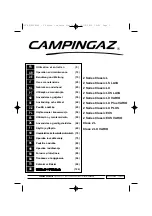
ENGLISH
9
OPERATING INSTRUCTIONS
With today’s lifestyle of striving to eat healthy and nutritious foods, one factor to consider is the importance of reducing fat
intake. One of the best ways to cut down on fat in your diet is to use a low fat method of cooking, such as grilling. As a pellet
grill uses natural hardwood pellets, the savory wood flavor is cooked into the meats, reducing the need for high sugar content
sauces. Throughout this manual, you will notice the emphasis on grilling food slowly at LOW or MEDIUM temperature settings.
GRILL ENVIRONMENT
1.
WHERE TO SET-UP THE GRILL
With all outdoor appliances, outside weather conditions play a big part in the performance of your grill and the cooking time
needed to perfect your meals.
All Pit Boss® units should keep a minimum clearance of 305 mm (12 inches) from combustible constructions, and this clearance
must be maintained while the grill is operational. This appliance must not be placed under overhead combustible ceiling or
overhang. Keep your grill in an area clear from combustible materials, gasoline, and other flammable vapors and liquids.
2.
COLD WEATHER COOKING
As it becomes cooler outside, that does not mean that grilling season is over! The crisp cool air and heavenly aroma of
smoked foods will help cure your winter blues.
Follow these suggestions on how to enjoy your grill throughout the cooler months:
• If smoking at low temperatures fails, increase the temperature slightly to achieve the same results.
• Organize – Get everything you require ready in the kitchen before you head outdoors. During the winter, move your
grill to an area that is out of the wind and direct cold. Check local bylaws regarding the proximity of your grill in
relation to your home and/or other structures. Put everything you need on a tray, bundle up tight, and get it done!
• To help keep track of the outside temperature, place an outdoor thermometer close to your cooking area. Keep a log
or history of what you cooked, the outdoor temperature, and the cooking time. This will help later down the road to
help you determine what to cook and how long it will take.
• In very cold weather, increase your preheating time by at least 20 minutes.
• Avoid lifting the lid any more than necessary. Cold gusts of wind can completely cool your grill temperature. Be
flexible with your serving time; add extra cooking time each time you open the lid.
• Have a heated platter or a dish cover ready to keep your food warm while making the trip back inside.
• Ideal foods for winter cooking are those that require little attention, such as roasts, whole chickens, ribs, and turkey.
Make your meal preparation even easier by adding simple items such as vegetables and potatoes.
3.
HOT WEATHER COOKING
As it becomes warmer outdoors, the cooking time will decrease.
Follow these few suggestions on how to enjoy your grill throughout the hot months:
• Adjust your cooking temperatures downward. This helps to avoid unwanted flare-ups.
• Use a meat thermometer to determine the internal temperature of your foods. This helps in preventing your meat
from over cooking and drying out.
• Even in hot weather it is still better to cook with the lid of your grill down.
• You can keep foods hot by wrapping them in foil, and placing them in an insulated cooler. Stuff crumpled up
newspaper around the foil and this will keep food hot for 3 to 4 hours.










































